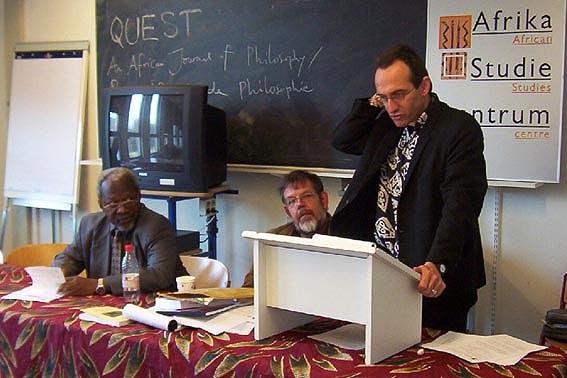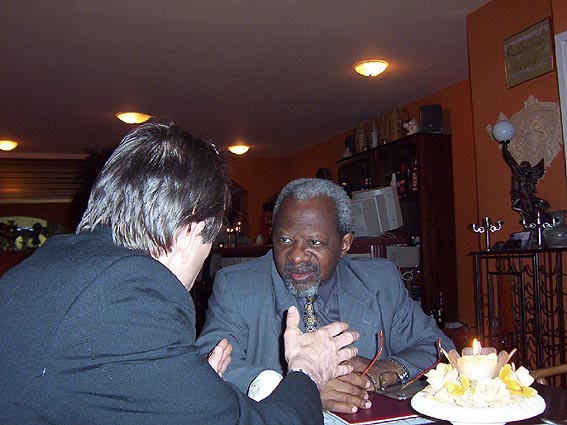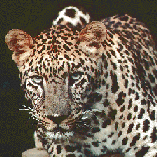
The transcultural framework for the construction of African knowledges /
Le cadre transculturel pour la construction des connaissances africaines:
Considérations méthodologiques, épistémologiques et politiques
 |
Quest
international Colloquium on: The transcultural framework for the construction of African knowledges / Le cadre transculturel pour la construction des connaissances africaines: |
| Methodological, epistemological, and
political considerations / Considérations méthodologiques, épistémologiques et politiques |
|
ISSN 1011-226 |
Quest: |
An
African Journal of Philosophy
|
| Revue
Africaine de Philosophie |
international colloquium in collaboration
with:
·
The African Studies Centre/ Centre d’Etudes Africaines,
Leiden
·
The Chair of Foundations of Intercultural Philosophy,
Philosophical Faculty, Erasmus University Rotterdam
·
The Dutch-Flemish Association for Intercultural Philosophy
(NVVIF)
| The
transcultural framework for the construction of African
knowledges: Methodological,
epistemological, and political considerations |
|
Le
cadre transculturel pour la construction des
connaissances africaines: Considérations
méthodologiques, épistémologiques et politiques |
time: Tuesday/Mardi 23rd March/mars, 2004, 13.30-17.00 hrs place: African Studies Centre,
Pieter de la Court building, Faculty of Social Sciences,
Wassenaarseweg 52, Leiden, room: 1A47 |
||
PROGRAMME:
Lectures I: The academic production of
African knowledges mainly by African intellectuals
in the chair: Wim van Binsbergen (EUR
Rotterdam / ASC Leiden / Quest )
13.30-13.31 Opening by the chair
13.31-14.10 Pieter Boele van Hensbroek (Groningen / ex-Quest ): ‘African intellectuals today: The modalities of South-North intersubjectivity in the social sciences as contrasted with philosophy’
14.10-14.50 Julie
Duran-Ndaya Tshiteku (ASC Leiden): ‘Entre le marteau et
l'enclume: Les défis de la recherche identitaire parmi son
propre groupe africain’
14.50-15.00 tea break
Lectures II: The academic production of
African knowledges involving non-Africans
in the chair: Pieter Boele van Hensbroek
15.00-15.40 René Devisch (Louvain): ‘Reading Wim van Binsbergen’s Intercultural Encounters (2003): A personal letter to an old friend’
15.40-16.20 Wim van Binsbergen: ‘ ‘‘Aristotle in Africa’’: Reflections on Truth in Politics (Quest XVI 1-2) as an attempt to apply mainstream Aristotelian rhetoric to significant political processes in modern Africa, especially the South African Truth and Reconciliation Commission (1994-1998)’
Presentation and key note
in the chair: Wim van Binsbergen
16.20-16.30 presentation of Quest XVI to Paulin Hountondji (Université de Bénin / African Institute for Advanced Study / Quest ) by Pieter Boele van Hensbroek
16.30-17.10 Paulin
Hountondji, Key note address ‘Le cadre transculturel pour la
construction des connaissances africaines: Considérations
méthodologiques, épistémologiques et politiques’
17.10-17.15 Closure by the chair
17.15-18.00 drinks at
the ‘village well’, African Studies Centre, same
building, same floor, in front of room 1A12
scroll on for pictures of the Colloquium, introduction of the speakers, and summaries
 From left to right: Paulin Hountondji (key note speaker, and member of the Quest advisory editorial board), Wim van Binsbergen (chair, and Editor of Quest), and Pieter Boele van Hensbroek (speaker; co-founder and lprevious Editor of Quest)
|
|
 Paulin Hountondji inspects the display of Quest volumes published over the years
|
|
 Some of the participants during the Colloquium
|
|
 Behind the executive table, from left to right: René Devisch, Julie Duran-Ndaya Tshiteku, Pieter Boele van Hensbroek, Wim van Binsbergen, Paulin Hountondji (holding his key note address)
|
|
 From left to right: Julie Duran-Ndaya Tshiteku (speaker), René Devisch (speaker), Gerti Hesseling (Director of the hosting African Studies Centre, Leiden), enjoying a well-earned drink after the Colloquium
|
|
 Pieter Boele van Hensbroek and Paulin Hountondji sharing a moment of friendship during the meal after the Colloquium
|
Speakers
and abstracts
Dr Pieter Boele
van Hensbroek, founder (with Ron Bwalya) and for 15 years Editor
of Quest,
Associate Professor of African Philosophy, University of
Groningen, Netherlands, and specialist on academic
socio-political thought in Africa since the late 19th
century. His current research mainly addresses the position of
African intellectuels, their potential, their problems, and their
social and political responsibilities. He will contrast
South-North exchange in philosophy with that in the social
sciences. Presentation in English.
Prof.Dr. René
Devisch, an anthropologist who has always worked on the
intersection between anthropology, philosophy, and
psychoanalysis; Africanist, and Professor at Louvain, Belgium. He
will approach our general theme by a critical reflection on Intercultural
encounters: African and anthropological lessons towards a
philosophy of interculturality (van Binsbergen), which has just
come out. Presentation in English.
Prof.Dr
Paulin Hountondji, Professor of Philosophy, Benin University,
Director of the African Institute for Advanced Studies, Porto
Novo, Benin, and one of the leading African philsophers today
– as well as member of the Advisory Editorial Board of
Quest. On the basis of his ongoing research and publication
projects, Prof. Hountondji will offer a general discussion of the
leading theme of this Colloquium; in passing he will reflect on
the role of Quest in this connection.
Drs Julie
Ndaya, of Zairese/Congolese origin, M.A. in ethnic studies
(Brussels), subsequently active in the field of intercontinental
development co-operation, and currently Associated Member of the
African Studies Centre, Leiden, where she just finished the first
version of her doctoral thesis on identitary expression,
especially in the religious field (in a movement named
‘Spiritual Battle’), among Zairese/Congolese in
Zaire/Congo and especially in the European diaspora. She will
speak on the problems of the politics of knowledge, and of
methodology, which this study has forced her to confront.
Presentation in French.
Prof.Dr Wim
van Binsbergen, Professeur of Intercultural Philosophy, Erasmus
University Rotterdam, Senior Researcher at the African Studies
Centre, Leiden, and currently Editor of Quest, will speak on the
dilemmas and the perspectives of African knowledge construction
on the basis of Volume XVI 1-2
of Quest, entitled: TRUTH IN
POLITICS: Rhetorical Approaches to Democratic Deliberation in
Africa and beyond.
As an exciting and topical exercise in intercultural philosophy,
this volume attempts to apply the western philosophical tradition
of rhetoric (Aristotle, Protagoras, Cicero – a tradition
which recently has undergone great renewal and is now enjoying a
considerable popularity in the philosophical study of politics
and identity) to African contexts, especially the analysis of the
Truth and Reconciliation Commission of South Africa (1994-1998).
This poses questions concerning the universal and the particular,
hegemony and anti-hegemony, the imposition of alien and
alienating Western models on Africa, and the possibility of
better understanding the dynamics of South Africa today on the
basis of models and parallels derived from other African
societies and polities, past and present. The articulation of
this type of questions takes up the 35
pp. Postscript in the Quest XVI volume ,
and in fact constitutes some sort of manifesto for Quest in coming
years. Presentation in English.
Languages
of communication / Langues de communication: anglais et français
Admission:
open and free / Toute personne intéressée est la bien venue;
entrée gratuite
The
Quest volume in question (XVI) is available at http://www.quest-journal.net / La volume de Quest
XVI est disponible sur http://www.quest-journal.net
Copies
of the newly published volume XVI of Quest will be for
sale during the Colloquium (€25; non-instituional buyers
receive a 30% discount and pay €17.50). Also back issues are
on display and orders can be placed
for
further contacts: editor@quest-journal.net
with
thanks to the Quest editorial team (comprising Sanya Osha
and Kirsten Seifikar, a.o.), the African Studies Centre, Leiden,
support Staff (especially Marieke van Winden and Maaike Westra),
and the African Studies Centre, Leiden, management (especially
Titia van der Werf)
 click
the image to return |
||||
|
 |
 |